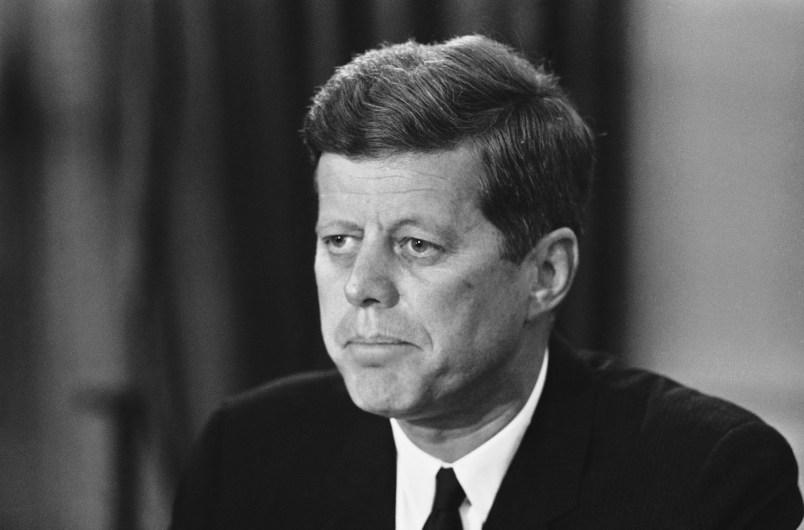John F. Kennedy’s assassination might have been almost inevitable. It didn’t have to happen on Nov. 22, 1963, but given a host of factors, JFK was unlikely to have made it out of his presidency alive.
Almost no one disputes that the security surrounding President Kennedy was thin on Nov. 22, as it usually was. The leader of the free world, the most powerful person on the globe, was guarded by twenty-eight Secret Service agents in Dallas, only twelve of whom were actually in the motorcade.
Just a few of JFK’s agents were close enough to the open car in which he was riding to do him any good in case of attack, yet he was passing an estimated 200,000 people from Love Field to Dealey Plaza — most swarming just a few feet away on crowded streets, others gathered with a view of him from open windows in buildings. It had been no different in Fort Worth that morning, when he spoke to hundreds of unscreened people outside his hotel, or in other stops on the Texas trip, or at many dozens of other events, at home and abroad, during his presidency.
Kennedy certainly understood his frightening degree of exposure, and thought a good bit about the possibility of assassination. Kennedy was fatalistic about it but he also had a false sense of invulnerability, perhaps relying on history’s odds. His White House predecessors had taken their chances and, since William McKinley in 1901, all had survived — though assassins had tried to kill both Roosevelts, Herbert Hoover and Harry Truman. And for the Texas trip, JFK preferred to avoid criticism that he was anxious about his reception in a place perceived as opposed to him.
Kennedy came to power just as inexorable forces in American life were colliding in a way certain to produce social upheaval during his term. Foremost was the civil rights movement. The dream of equality for African-Americans could no longer be deferred, yet the clash with deeply rooted traditions of segregation, especially in the South, guaranteed considerable violence. Just as in the 1860s, the shedding of blood was a precondition for racial justice. An army of racists could have been gunning for JFK after civil rights legislation passed.
The Cold War had generated deep fears of Communism, especially on the right. Any attempt at compromise to decrease tensions between East and West was viewed by millions as betrayal. The leaflets distributed in Dallas for Kennedy’s visit that bore his photo and the caption WANTED FOR TREASON were just a hint of what might have come. Kennedy had made lasting enemies among an intransigent community of anti-Castro exiles who never forgave him for the Bay of Pigs. Names from this group constantly appear on lists of possible additional Kennedy assassins.
It wasn’t just the Cubans. By 1963 many pro-defense hawks eyed Kennedy with great suspicion, dismayed by what they regarded as Kennedy’s “weak” responses in Berlin and Cuba, and his desire to negotiate with the Soviet Union. Rabble-rousers such as retired General Edwin Walker (Oswald’s first assassination target) had thousands of extremist followers whose animus toward Kennedy was visceral. They could have grown to menacing proportions had JFK deescalated the Vietnam conflict in his second term.
Add it all together: JFK’s lengthy list of enemies, racial turmoil greater than the nation had seen since the Civil War, social upheaval that unsettled millions, the clash between the anticommunist right wing and those willing to negotiate with the Reds, and most of all, a shockingly casual approach to presidential security based on utterly false assumptions. This toxic combination of trends and events made Kennedy a terribly vulnerable target for murder.
JFK was a marked man. If Lee Harvey Oswald had never been born, if the Texas trip had never been scheduled, John F. Kennedy would still have faced great peril every day of his presidency. Given all the factors threatening JFK’s safety, even without Dallas, Kennedy would have been very lucky to have survived to January 20, 1969.
© 2013 Larry J. Sabato, author of The Kennedy Half-Century: The Presidency, Assassination, and Lasting Legacy of John F. Kennedy
Larry J. Sabato, author of The Kennedy Half-Century: The Presidency, Assassination, and Lasting Legacy of John F. Kennedy, is the founder and director of the renowned Center for Politics at the University of Virginia. He has appeared on dozens of national television and radio programs, including 60 Minutes, Today, Hardball, and Nightline. He has coanchored the BBC’s coverage of U.S. presidential returns and inaugurations, and has authored or edited more than a dozen books on American politics, including the highly praised A More Perfect Constitution: Why the Constitution Must Be Revised — Ideas to Inspire a New Generation. His other books include Feeding Frenzy, about press coverage of politicians; The Rise of Political Consultants; and Barack Obama and the New America. Sabato runs the acclaimed Crystal Ball website, which has the most comprehensive and accurate record of election analysis in the country. In 2001, the University of Virginia gave him its highest honor, the Thomas Jefferson Award. He lives in Charlottesville, Virginia.
For more information please visit thekennedyhalfcentury.com, and follow the author on Facebook and Twitter.






